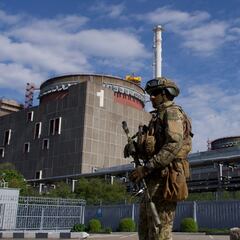Who was Mikhail Gorbachev?
The final premier of the Soviet Union has died aged 91 leaving behind a complex legacy divided upon the lines of the Cold War he inadvertently helped end.


Mikhail Gorbachev has died. A Soviet leader long-admired in the west, he headed the empire from 1985 until its dissolution in 1991.
He is credited in the west by ending the Cold War, the decades long conflict between the Soviet Union and NATO, headed by the Soviet’s sworn enemy the United States. He also opened up the Soviet Union to open division and free market economics that ultimately destroyed it, leading to the independence of a host of nations including Ukraine, Kazakhstan and the Baltic states, as well as the reunification of Germany.
Two of his best known policies in the west are ‘Glasnost’ and ‘Perestroika’, openness and restructuring in English, which turned the Soviet Union away from totalitarian control and towards the world economy.
He said in an interview with Tass on his 90th birthday: “I deeply believe that Perestroika was necessary and we were taking it in the right direction. The main domestic achievement was to give freedom to the people and put an end to the totalitarian system. And the most important things on the international stage were ending the Cold War and conducting radical nuclear weapons cuts.”
The opening of western fast food restaurants like McDonald’s was seen as heralding a new era for the Soviet Union. Gorbachev himself featured in a Pizza Hut advert after the collapse of the Union.
Mikhail Gorbachev, the last leader of the Soviet Union, has died, per AFP.
— unusual_whales (@unusual_whales) August 30, 2022
He allowed companies like Pizza Hut to enter into Russia, and thus one of the greatest commercials of all time was created.
RIP: pic.twitter.com/Hpqs2sxtWe
“You’re lagging behind the rest of the economy,” he told the communist bosses of Leningrad in 1991. “Your shoddy goods are a disgrace.”
However, this ‘opening’ ended with the situation of Russia today, a nation as ostracised from the west as it was at the height of the Cold War as it continues to wage its bloody war in Ukraine.
While western countries may be glad of his role in finishing off its main enemy, people in Russia may not have as glowing a reference of their former leader.
How do Russians remember Gorbachev?
While he helped end the Cold War, it did so by the Soviet Union tearing itself apart. Whether this was an inevitability is another discussion, but being the leader during this leads to bad press. Once a superpower to rival the United States, the breakup of the multi-ethnic empire reduced Russia’s standing in the world and left the US as the global hegemon unabated. For this reason, Russians of a certain age and persuasion may not be fond of him.
This was shown as early as 1996, when an attempt in presidential elections in Russia garnered him just 0.5 percent of the vote.
Related stories
In terms of ‘Perestroika, the market opening, there is evidence that it was more destructive than productive. In his 2017 biography of Gorbachev, William Taubman writes, “only 11 percent of 989 consumer goods monitored by an economic research organization were readily obtainable. Almost entirely absent from stores were televisions, refrigerators, washing machines, most household cleaning products, furniture of all sorts, electric irons, razor blades, perfumes and cosmetics, school notebooks and pencils.”
In the long term, the unrestricted market opening led Russia to where it is today; under the grip of a strongman and dominated by a host of oligarchs that corruptly control important industries across the country. This opening was inevitable and the events after cannot be blamed on Gorbachev, but Russians were left in a rudderless position with exploitation gaping.

